Real Estate
Real estate practice is almost exclusively a transactional practice, where the work revolves around negotiating and drafting contracts for transactions related to real estate. Real estate practice within BigLaw includes two main categories: real estate finance (lending transactions related to real estate) and the purchase or sale of property or a large portfolio of real estate assets (often referred to as “dirt law”). In addition, some real estate groups work on large leasing transactions. Some BigLaw firms’ real estate practices heavily emphasize real estate finance, while others focus on the purchase or sale of property, with some engaging in a combination of both. Other real estate practices may focus largely on “M&A support” – functioning as a support group for due diligence and negotiation for real estate-related aspects of a larger merger or acquisition of a company, versus standalone real estate transactions.
For law students considering a BigLaw firm’s real estate practice, it is crucial to delve deeper into the specific focus of the group within real estate. Understanding whether the emphasis lies in financing, “dirt law,” M&A support, or a combination will help students determine if that firm’s real estate practice is the right fit for them and their career goals.
On a day-to-day basis, real estate attorneys at BigLaw firms typically engage in due diligence (analyzing title records, surveys, environmental reports, loan documents, leases, and other items for issues), drafting contracts for real estate-related loans and transactions (which can heavily depend on standard forms), structuring transactions to meet client objectives (including to reduce tax liability), negotiating with the “other side” of a deal, coordinating the proper filings for the loan or transfer of property, and other activities. Generally, real estate attorneys practice the transactional lawyering skills commonly seen in general corporate, M&A, or finance work (drafting, negotiation, and due diligence), but with a depth of experience in the particular asset class of real estate.
Many real estate attorneys are attracted to this practice area because of how tangible the “product” is: as opposed to transactions for financial assets or litigating a specific legal theory, real estate attorneys can point to a specific building or piece of land as the subject of any transaction.

Featuring Fried Frank, Troutman Pepper, and Allen Matkins
Watch this interesting and fun panel discussion about the different types of Real Estate work at top firms, including real estate finance, acquisitions, development, leasing, and others, how to prepare for a career in Real Estate law, and how to determine if Real Estate is the right practice for you.
Featuring:
-Simon Elkharrat, Fried Frank
-Stefanie Brennan, Troutman Pepper
-Andrew Demirchyan, Allen Matkins
watch

Summer Associate Hub’s video series, where we interview BigLaw attorneys about their practice in under 6 minutes (also known as 0.1 billable hours).
Allison Kidd
Real Estate Partner
Check out these short and helpful videos from Hotshot, a video-based learning platform used by top law firms and law schools.
These videos are a great way to get an overview of Real Estate practice as it relates to lending transactions, to determine if this practice area is right for you, and to prepare for networking calls and interviews.
These links will direct you to Hotshot’s website, where you can sign up for a free trial and access to 3 free courses. To watch more, use promo code “SAHub” to get 30% off Hotshot’s student rate (which brings the cost down to just $6 per month). Use your .edu email address to sign up, and if your school already subscribes to Hotshot you’ll automatically be added to its account!
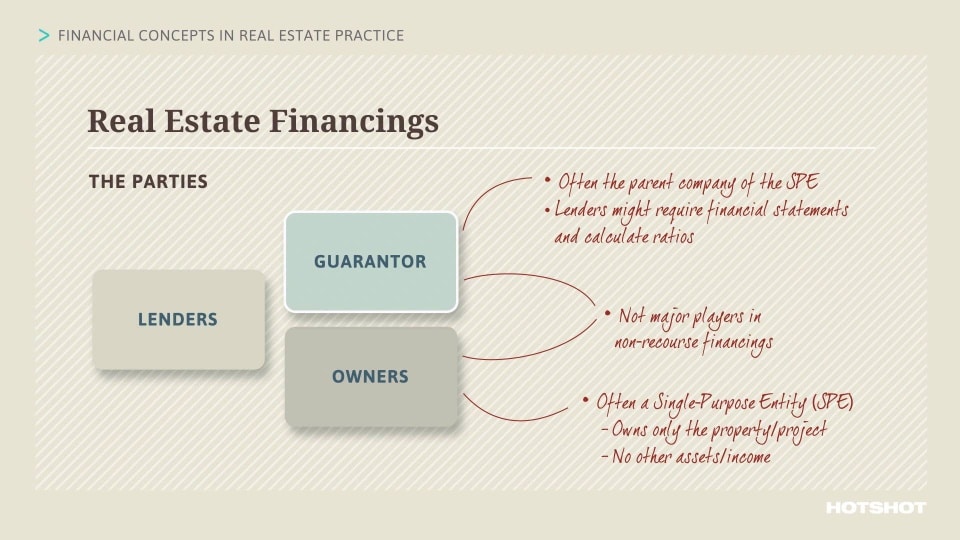
Hotshot
Financial Concepts in Real Estate Practice
The key financial concepts in real estate practice, including when financial concepts come into play, financial soundness and guarantors, and covenants and ratios.
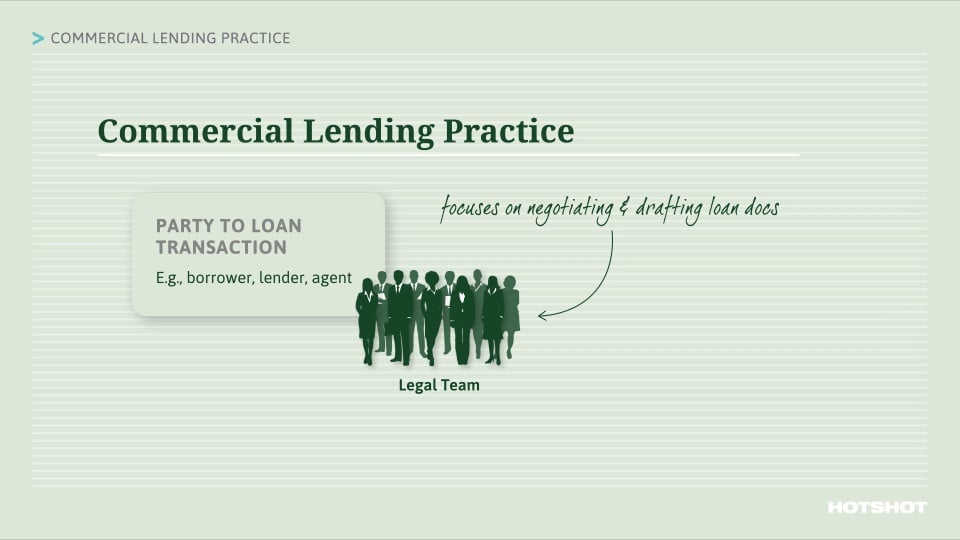
Hotshot
Commercial Lending Practice
This course looks at commercial lending practice at a large law firm, including what commercial lending is, who the main players are, and the differences between borrower and lender representations. It also covers how deals are staffed and the roles of finance partners, associates, support staff, and the clients.
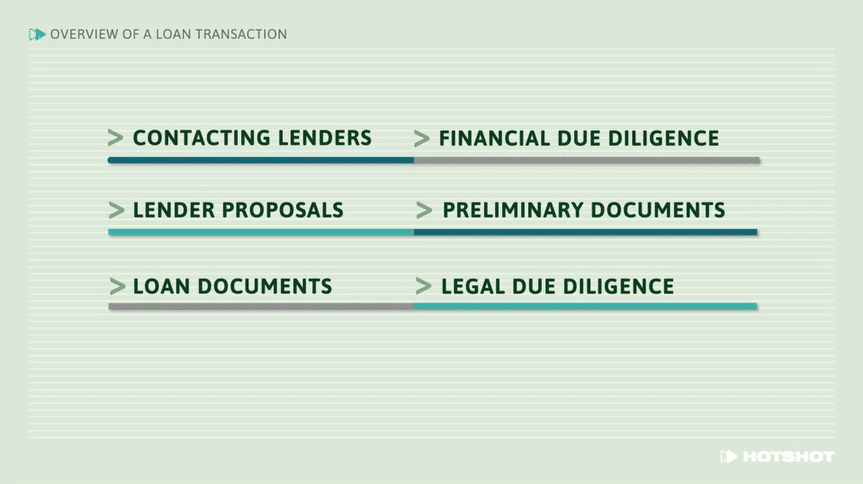
Hotshot
Overview of a Loan Transaction
An overview of the main stages of a typical loan transaction, including preliminary negotiations, drafting the main documents, preparing for and closing the transaction, and ongoing compliance matters.
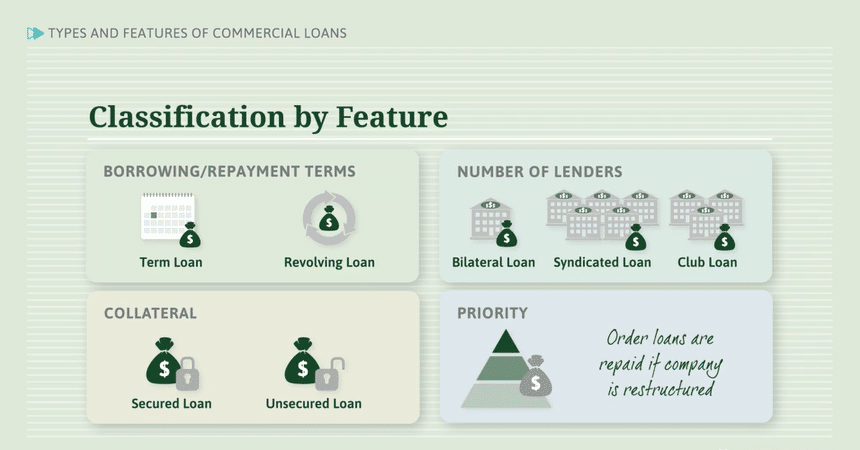
Hotshot
Types and Features of Commercial Loans
This course looks at commercial lending practice at a large law firm, including what commercial lending is, who the main players are, and the differences between borrower and lender representations. It also covers how deals are staffed and the roles of finance partners, associates, support staff, and the clients.
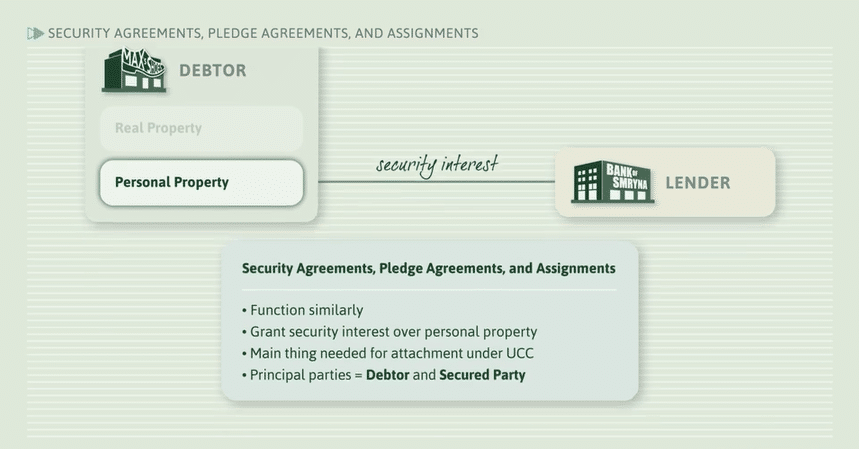
Hotshot
Security Agreements, Pledge Agreements, and Assignments
A look at security instruments like security agreements, pledge agreements, and assignments. A discussion about the purpose of security instruments and their important provisions is also included.
LISTEN
Check out these episodes from the How I Lawyer Podcast, a series by Georgetown Law professor Jonah Perlin.
Jonah talks to attorneys throughout the professions about what they do, why they do it, and how they do it well.
This podcast series is a great way to learn directly from attorneys about what the day-to-day work is like in different practice areas.
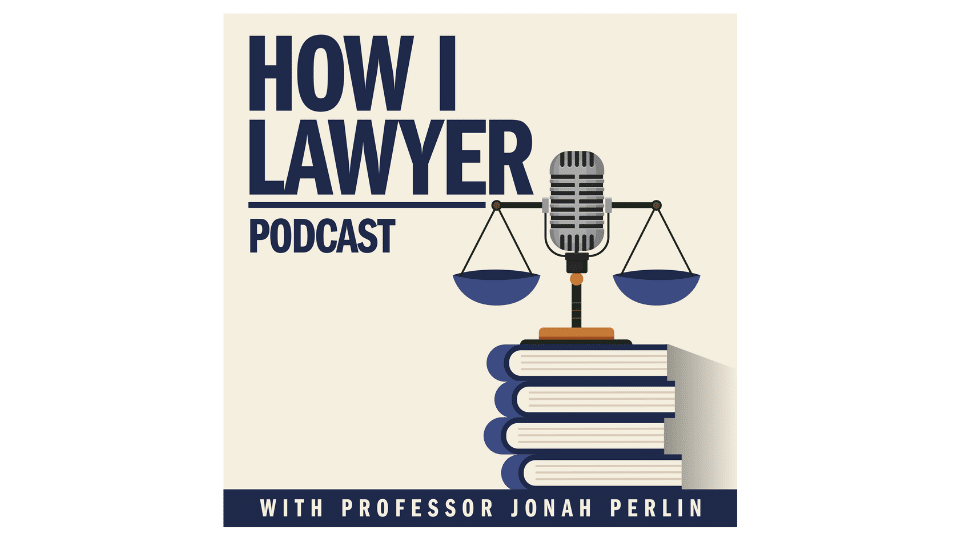
Priya Coffey, Jackson Walker
In this episode, Jonah speaks with Priya Coffey, Real Estate Partner at Jackson Walker in Houston, Texas. Priya assists clients with complex commercial real estate transactions, including the representation of buyers and sellers in the acquisition and disposition of raw land, office buildings and retail centers, and the representation of landlords and tenants in commercial office building leases and retail leases. Priya’s experience extends to advising her clients on land use matters, City of Houston ordinances and other governmental compliance related matters. She also represents both buyers and sellers in the acquisition and disposition of high-end residential property.
PRACTICE
Check out these interactive exercises brought to you by Praktio, a modern training platform for reviewing and drafting legal documents. Use these exercises to practice these tasks, make mistakes, and learn from them!

Praktio has teamed up with Summer Associate Hub to make these exercises available to law students for free – these links will direct you to Praktio’s platform, where you may be required to create a free account.
These courses are a great way for law students to get a glimpse of real estate practice. We selected these exercises as only some of the key tasks on which corporate finance/lending associates work (and, of course, this practice involves many other types of exercises).
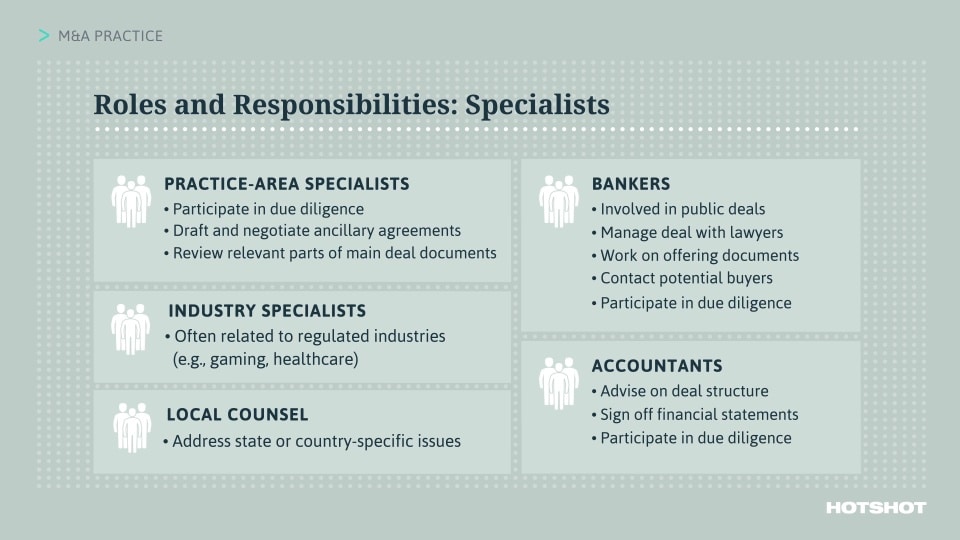
Praktio @ SA Hub
Doing Due Diligence
Although due diligence is famous as a key stage in M&A transactions, it is also an important part of real estate transactions, such as reviewing leases and other contracts, title information, and environmental reports. This exercise covers general contract due diligence. Due diligence goes hand in hand with drafting disclosure schedules, which are the subject of the exercise below.

Praktio @ SA Hub
Disclosure Schedules
Disclosure schedules are an important aspect of real estate transactions, to list assets and other items, as well as exceptions to statements made in the agreements.

Praktio @ SA Hub:
Signature Pages
Signature pages are a key task for junior associates in any transactional practice, including real estate. Because it is the vehicle for the actual signing and closing of the transaction, organizing accurate signature pages is a very important task for any transaction and something that clients rely on the law firm to handle reliably.


